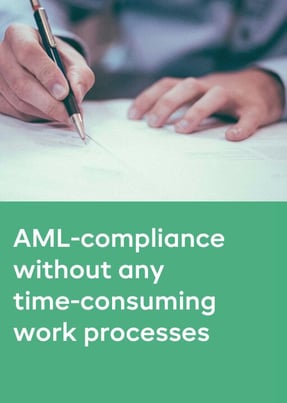- Products
- RegLab for ...
- Knowledge centre
Download the AML glossary >
 Discover the essential AML compliance terminology and gain instant access to a comprehensive guide
Discover the essential AML compliance terminology and gain instant access to a comprehensive guide - The company
Working at RegLab >
There may not be any vacancies that perfectly match your profile, but that does not mean there is no room for someone who can improve RegLab.
- Book a demo
AML: 5 FAQs
The AML Act aimes at preventing the use of the financial system for money laundering and terrorist financing. In English, the abbreviation translates to 'Anti-Money Laundering'. Below are the 5 FAQs about this Act.
Why was the AML Act created?
As described above, it was created to prevent and combat money laundering and the financing of terrorism. The aim is to safeguard the integrity of the financial sectors. Firms that are subject to AML must assess and record the risks of money laundering and terrorist financing. This has direct consequences for the Customer Due Diligence that must take place.
How does the Dutch Wwft relate to AML?
AML (Anti Money Laundering) is an international Act, also known as the 5th AML directive or 5AMLD. It lays down the guidelines for money laundering at the European level. Based on these guidelines, EU countries must implement them in their own legislation. In the Netherlands, these principles are laid down in the Wwft. You can read more about the AML on this page.
How does AML interfere with Customer Due Diligence?
If you are subject to the AML, a Customer Due Diligence (CDD) check of your clients is mandatory. This check is based on the KYC policy. What exactly needs to be done is described in the AML. The reason for screening your clients is to map the risks that you take when accepting new clients. Are there any signs of money laundering and terrorist financing, or are you identifying any suspicious transactions? Then you must report this. The extent of the investigation depends on the risk sensitivity. Conducting a sound KYC policy leads to carefree and responsible entrepreneurship.
Who is affected by AML?
Here you will find the current overview of reporting institutions of the Financial Intelligence Unit, better known as FIU-Netherlands.
- Banks
- Insurers
- Investment institutions
- Administration offices
- Real estate
- Accountants
- Tax consultants
- Trust offices
- Lawyers
- Notaries
Article 1 of this Prevention of Money Laundering and Terrorist Financing Act includes an overview of all entities that are subject to this Act.
What is mandatory?
Pursuant to Article 3 of the AML, the following is mandatory:
- identifying your clients.
- verifying clients’ identities.
- tracing the Ultimate Beneficial Owner and verifying his identity.
- establishing the purpose of the business relationship.
- monitoring this relationship and the transactions involved.
- screening the natural person representing the client and also whether he is authorized to do so.
- identifying the natural competent person.
- taking risk-based measures to verify whether your client is representing himself or a third party.
- reporting any unusual transactions in the reporting portal of the Financial Intelligence Unit - Netherlands (FIU-the Netherlands).
RegLab for AML
Do you also spend a lot of time on a Know Your Customer and Customer Due Diligence policy to comply with AML requirements? Despite the frustrations they may generate, the KYC principles are becoming increasingly important. RegLab helps firms quickly, safely and easily comply with the laws and regulations pertaining to the Know your Customer policy.
Themed file: fully prepared for the supervisor’s audit
This article is part of a number of articles and downloads that will help you prepare yourself for the supervisor’s visit. This content is based on a supervisor's FAQs during an audit. Do you want to be 100% AML-proof and ready for the supervisor’s visit? Find all FAQs in our Knowledge Centre.





